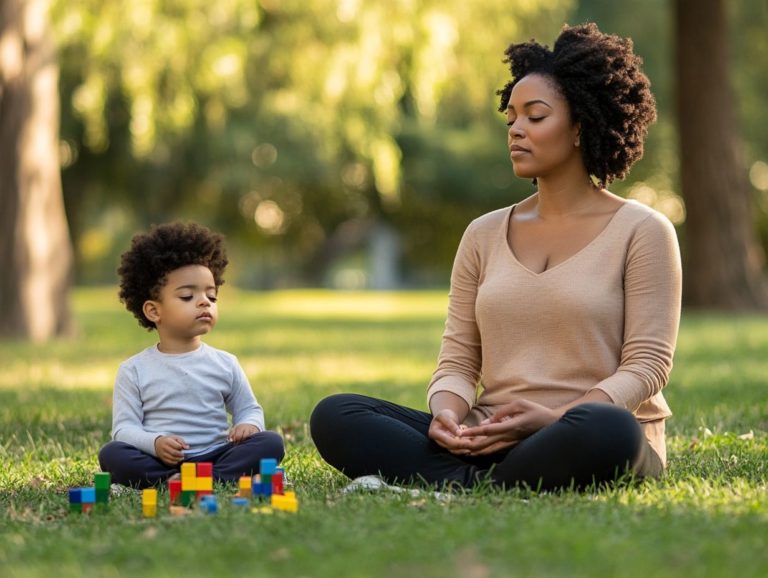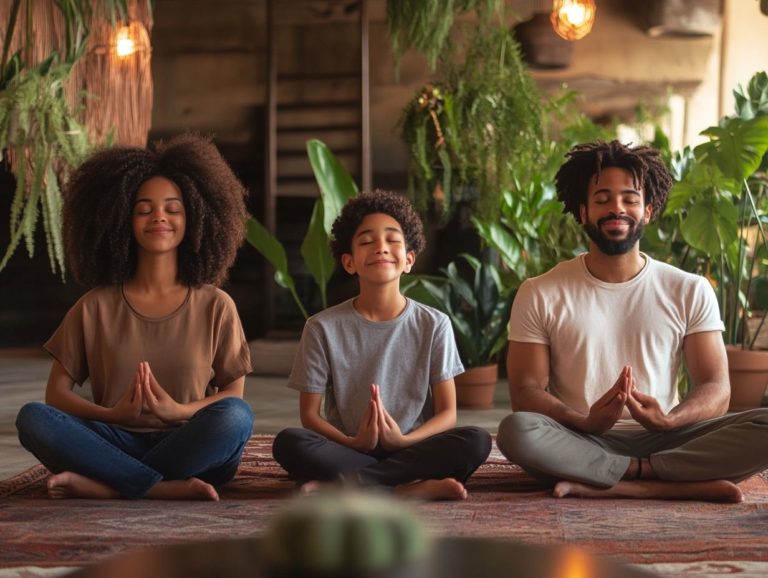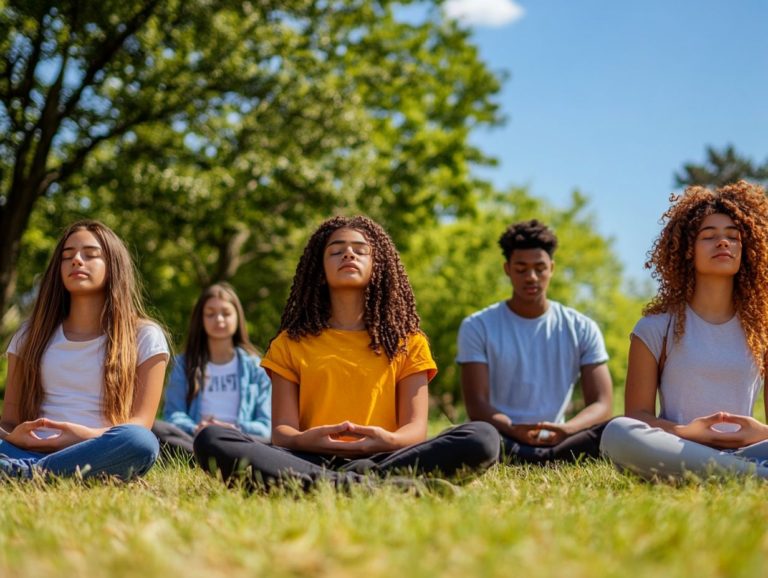5 Mindful Practices to Start Each Day
Transform your mornings and elevate your life by harnessing the power of a structured routine! Starting each day with intention, mindfulness, and a structured morning routine has the potential to transform not only your mornings but also your entire outlook on life.
Consider integrating five powerful practices into your routine: meditation, gratitude, setting daily intentions, mindful movement or a mindful workout, and a digital detox. These daily practices can significantly enhance your mental health and physical well-being.
By incorporating these habits, you can cultivate a sense of calmness, improve your mood, and create a more fulfilling day. Take the time to explore the benefits of these mindful approaches and unlock a deeper sense of purpose and tranquility in your life.
Contents
- Key Takeaways:
- 1. Meditation or Mindful Breathing
- 2. Gratitude Practice
- 3. Setting Intentions for the Day
- 4. Mindful Movement or Yoga
- 5. Digital Detox
- How Can Mindful Practices Benefit Your Day?
- Frequently Asked Questions
- 1. What are 5 mindful practices to start each day?
- 2. How does gratitude help in starting each day mindfully?
- 3. Can setting intentions at the start of the day improve mindfulness?
- 4. What is the role of deep breathing in practicing mindfulness?
- 5. How can visualization be incorporated into a daily mindfulness practice?
- 6. What are some examples of mindful movements to start the day?
Key Takeaways:

- Start your day with a few minutes of meditation or mindful breathing to clear your mind, engage in mindful wakeup, and set a calm tone for the day ahead.
- Practice gratitude by focusing on the things you are thankful for through gratitude journaling, and watch as it improves your overall mental health and emotional well-being.
- Take a moment to set intentions for your day, and approach each task with mindfulness and purpose to stay present and focused.
1. Meditation or Mindful Breathing
Meditation and mindful breathing are essential practices that cultivate mindfulness, enhancing your ability to be present and aware in each moment. By incorporating techniques like deep breathing and body scan meditations a practice where you mentally check in with different parts of your body into your daily routine, you can significantly reduce stress and anxiety, ultimately leading to improved emotional well-being, mental health, and awareness of body sensations.
As you delve into these practices, you’ll begin to appreciate their transformative potential, fostering a deeper connection with your thoughts and emotions.
For instance, mindfulness meditation invites you to focus on your breath while observing your thoughts without judgment, promoting a sense of clarity and calm. The body scan technique encourages you to mentally check in with different parts of your body, helping you identify areas of tension and embrace the art of letting go.
Mindful breathing can easily be woven into your daily activities perhaps by taking a moment to inhale deeply before responding to a stressful email or practicing mini-meditations and mindful moments during your breaks at work.
These small adjustments can lead to significant improvements in your mood shifts and resilience over time, showcasing how effectively you can harness these techniques to navigate the challenges of daily life.
2. Gratitude Practice
A gratitude practice serves as a remarkable tool for enhancing your emotional well-being. It encourages you to shift your focus toward the positive aspects of life, promoting mental health through self-care and positive affirmations, as well as compassion toward yourself.
By regularly reflecting on what you are thankful for, you can cultivate an optimistic outlook, which is essential for building resilience in the face of life’s challenges. This intentional focus on gratitude not only alleviates feelings of anxiety and depression but also significantly enhances your overall life satisfaction.
To maintain a consistent gratitude practice, consider setting aside just a few moments each day for journaling. Whether you jot down three things you appreciate or delve into a more detailed account of positive experiences, these gratitude journaling strategies can dramatically improve your emotional regulation.
Over time, this habit reinforces a positive mindset, giving you the power to approach life s difficulties with greater ease and composure.
In summary, implementing these five practices into your daily routine can significantly enhance your overall well-being and create a more fulfilling life. Start today, and discover the transformative power of mindfulness and gratitude!
3. Setting Intentions for the Day
Setting intentions for your day is a vital practice in mindfulness. It sharpens your mental clarity and focus. This practice gives you the power to approach your daily activities with a sense of purpose and conscious awareness.
By dedicating a few moments each morning to reflect on your desired outcomes, you can supercharge your thoughts and actions toward what truly matters in your life. This ritual provides direction. It enhances your decision-making by aligning daily choices with your personal values and goals, contributing to personal growth.
For instance, if you set an intention to be more patient, you may find yourself responding more thoughtfully in stressful situations.
Utilizing techniques such as journaling or repeating affirmation phrases can further anchor these intentions. This deepens your sense of commitment and enhances your mental resilience. As a result, this mindful approach can significantly elevate your focus and productivity, creating a day that is not just busy, but meaningful and rewarding.
4. Mindful Movement or Yoga

Mindful movement practices, such as yoga, invite you to cultivate a deeper connection with your body. These practices enhance your body awareness and help you regulate physical sensations. They play a significant role in reducing stress and achieving emotional balance.
Tai chi presents another graceful form of mindful movement. It merges slow, deliberate motions with deep breathing and focused intention. Engaging in these practices enhances your flexibility and strength while nurturing a profound sense of calm, body awareness, and inner peace.
As you immerse yourself in these mindful exercises, you’ll likely discover blossoming self-compassion. You develop greater awareness of your physical and emotional states without any judgment.
Prioritize this holistic approach to movement today. You can unlock improved mental clarity, emotional well-being, and body awareness, paving the way for a healthier and more fulfilling life.
5. Digital Detox
A digital detox is a mindful practice that invites you to disconnect from technology. This practice allows you to cultivate a deeper emotional connection with yourself and the present moment, enhancing your attention restoration. This intentional break can significantly enhance your stress management and emotional well-being.
In today s fast-paced, always-connected world, the relentless notifications and endless scrolling can lead to increased anxiety and feelings of isolation. Embracing a digital detox provides you with a much-needed break from this overwhelming flood of information. It creates space for improved mental clarity.
When you consciously take time away from screens, you open up opportunities to immerse yourself in enriching activities like reading, exercising, mindful driving, or enjoying quality moments with loved ones. Each of these can dramatically elevate your overall happiness.
Implement simple techniques, such as setting specific hours without devices or creating tech-free zones in your home. These can profoundly impact your ability to achieve a healthier balance and improve stress management. This practice encourages mindfulness and presence in your everyday life, fostering a more fulfilling and connected existence.
How Can Mindful Practices Benefit Your Day?
Mindful practices offer a wealth of benefits that can transform your daily life. They enhance your mental resilience, effectively reduce stress, and improve emotional regulation keys to personal growth and self-care.
Incorporating techniques such as meditation, deep breathing, mindful transitions, and mindful eating can significantly shift your emotional states. They cultivate a sense of peace and clarity amid the chaos of everyday life. Engaging in regular meditation equips you to navigate stressful situations better, experiencing a noticeable reduction in anxiety and an increased sense of focus.
Practicing gratitude through journaling can elevate your happiness and allow you to appreciate the small joys that often go unnoticed. Ultimately, these mindfulness practices uplift your mood and enhance your overall well-being, fostering healthier relationships and a more balanced lifestyle.
What Are the Benefits of Meditation and Mindful Breathing?
Meditation and mindful breathing offer a wealth of benefits, chief among them being remarkable reductions in stress, anxiety, and depression. These practices profoundly enhance your mental health and promote emotional well-being.
Research indicates that engaging in meditation can significantly boost your focus and concentration. This allows you to immerse yourself more deeply in your tasks.
A study featured in the journal ‘Cognitive, Affective, & Behavioral Neuroscience’ revealed that individuals who practiced mindfulness exhibited improved cognitive control and neuroplasticity. This enables them to filter out distractions and enhance their performance.
Experts in psychology emphasize that regular meditation fosters a heightened awareness of your thoughts, giving you the power to manage your mental processes with greater efficacy. As a result, incorporating mindful breathing into your daily routine not only bolsters your emotional resilience but also sharpens your overall cognitive abilities.
How Can a Gratitude Practice Improve Your Mental Health?

Engaging in a gratitude practice can profoundly enhance your mental health by nurturing self-compassion, elevating your emotional well-being, and fostering positive affirmations that transform your perspective on daily life.
Research reveals that individuals who consistently engage in gratitude practices report lower levels of anxiety and depression, alongside increased optimism and life satisfaction. By dedicating just a few moments each day to reflect on what you re thankful for, you can significantly shift your outlook on life.
To effortlessly weave gratitude into your daily routines, consider keeping a gratitude journal. Each evening, jot down three things you are grateful for. Another effective strategy is to express your appreciation verbally to those around you or create a gratitude jar, filling it with notes that capture moments of thankfulness over time.
These simple yet profound shifts can lead to substantial improvements in your overall mental well-being.
Why Is Setting Intentions Important for Mindfulness?
Have you ever wondered how setting intentions can change your mindfulness practice? Let s explore its importance.
Setting intentions is an essential element of mindfulness that sharpens your focus and enhances your ability to focus, giving you the power to make deliberate decisions that resonate with your goals and values.
By clarifying your desires and motivations, intention setting cultivates a deeper awareness of your personal priorities. This practice helps you see what distracts you and strengthens your commitment to take meaningful actions.
For example, if you aim to enhance your health, you might set a daily intention to prioritize nutritious meals and regular exercise, guiding your choices throughout the day.
Similarly, if you’re looking to advance in your career, you could establish intentions related to networking and skill development, encouraging proactive behaviors that align with your long-term aspirations. This structured approach acts as a guiding principle, fostering both mindfulness and intentionality in your daily life.
What Are the Physical and Mental Benefits of Mindful Movement?
Mindful movement, such as yoga, offers you a wealth of physical and mental benefits, enhancing your bodily awareness while effectively reducing stress and promoting overall mental health.
By encouraging you to tune into your body, mindful movement nurtures a deeper connection to your physical sensations. This heightened awareness allows you to recognize tension or discomfort, giving you the power to respond more effectively to physical stressors.
Such practices have been proven to enhance emotional regulation; adopting a mindful approach can significantly alleviate symptoms of anxiety and depression, fostering a more balanced emotional state.
Engaging in these movements not only improves your flexibility and strength but also equips you with essential tools to better manage your reactions to life s challenges, ultimately cultivating resilience and well-being.
How Can a Digital Detox Improve Your Well-Being?
Engaging in a digital detox can enhance your well-being. It nurtures mindfulness and enriches emotional connections, leading to better stress management and mental clarity.
When you intentionally unplug from screens, you unlock a treasure trove of experiences that might have slipped through the cracks amid constant alerts and digital distractions. This digital disconnection lets you enjoy the world around you. You can appreciate simple joys, like nature, art, or quality time with loved ones.
To implement an effective digital detox, consider establishing specific time frames perhaps a weekend retreat or even a few hours each day. Immerse yourself in physical activities or hobbies that spark your creativity. You ll often find a sense of grounding and presence, rediscovering the true essence of living in the moment.
Frequently Asked Questions
1. What are 5 mindful practices to start each day?
The 5 mindful practices to start each day are gratitude, intention setting, deep breathing, visualization, and mindful movement.
2. How does gratitude help in starting each day mindfully?
Gratitude helps to shift our focus from negative thoughts to positive ones. It reminds us of the good things in our life and sets a positive tone for the day.
3. Can setting intentions at the start of the day improve mindfulness?
Yes, setting intentions helps to bring awareness to our thoughts and actions. It guides us towards our desired mindset and behaviors throughout the day.
4. What is the role of deep breathing in practicing mindfulness?
Deep breathing helps to calm the mind and body. It reduces stress and anxiety while increasing focus and awareness on the present moment.
5. How can visualization be incorporated into a daily mindfulness practice?
Visualization involves imagining positive outcomes and experiences. When practiced regularly, it can help to improve mood, motivation, and overall well-being.
6. What are some examples of mindful movements to start the day?
Mindful movements can include yoga, stretching, or simply taking a few minutes to tune in to the body. Notice any tension or discomfort, and then intentionally release it through gentle movements.







